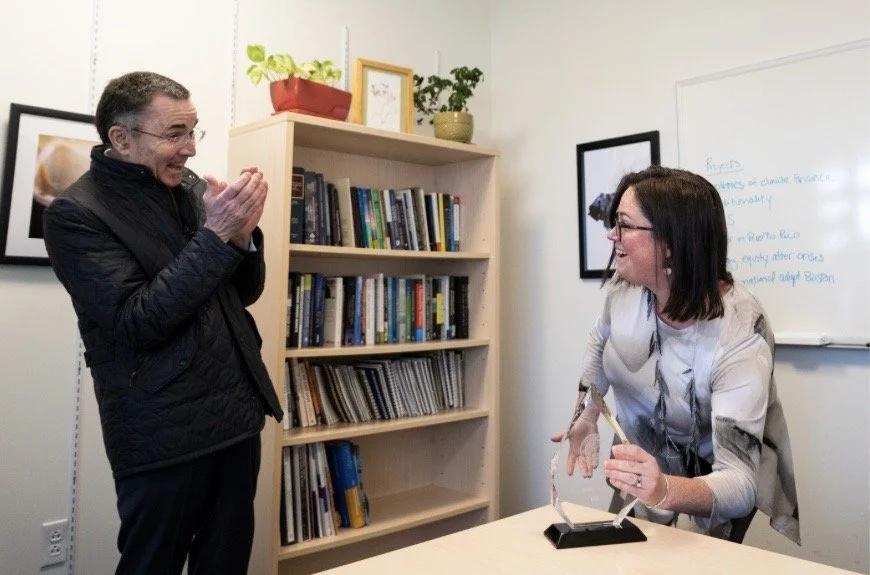
Teaching
UNIVERSITY EXCELLENCE TEACHING AWARD
In 2023 I was awarded the University Excellence Teaching Award, where every year Northeastern recognizes educators who demonstrate deep expertise in their field, provide rigorous content in their courses and inspire their students.
https://news.northeastern.edu/2023/04/03/university-excellence-teaching-award-recipients
I have the privilege of working with inspiring students who are passionate about creating a socially-just world. I see my role as a professor to nurture that passion and help students engage critically with some of the greatest challenges our world faces. My goal is to expose my students to new perspectives on critical issues, provide them with the tools to analyze these issues from scientific, socioeconomic, and policy perspectives, and inspire them to develop solutions. This approach requires that I teach students to conduct rigorous research, critical and ethical analysis, and to communicate their findings effectively through writing and presentations. My courses focus on comparative analysis and a global perspective with a particular emphasis on developing countries. I frequently bring my research and field experience into the classroom. Whether this involves discussing the challenges of technology adoption for smallholder farmers in Honduras, how gender was superficially integrated into development projects in Ethiopia, or the feeling of euphoria in Paris when the climate agreement was reached, I use my research and personal experience to ground our theoretical discussions in practical realities. Additionally, I bring scholars and practitioners to the classroom to provide a diverse range of perspectives. Syllabi of courses taught at Northeastern are listed below.
PPUA/INTL 5268: INTERNATIONAL ENVIRONMENTAL POLICY
This course explores key environmental challenges and policy solutions from an international perspective. It emphasizes the complexity of human-natural systems for environmental policy design, and provides a history of international environmental politics, as well as discussion of contemporary policy issues, including conservation, water, fisheries, and agriculture. Key paradigms for understanding environmental challenges are presented, and students are equipped with the analytical tools to look critically at important debates, understand the role of different actors, and assess policy options from multiple perspectives. Analysis of power, politics, equity and justice are integrated throughout.
INTL 4700: INTERNATIONAL AFFAIRS SENIOR CAPSTONE
This course is a senior research and writing seminar. It represents an opportunity to explore an issue in international affairs that students find personally engaging and reflect on and synthesize their undergraduate experiences: from courses to experiential education. Through this course students gain in-depth exposure to different research approaches and methodologies, become critical readers and writers of scholarly research, and produce a senior thesis.
INTL/PPUA 5100: CLIMATE AND DEVELOPMENT
Climate impacts threaten to reverse many of the development gains of the last century, and the most vulnerable will be the most impacted by climate change. At the same time, opportunities exist to ensure climate-compatible development pathways. This course serves as an introduction to climate change and development processes in developing countries. Through this course, students are exposed to key concepts and debates in the fields of climate change and international development including resilience, transformation and the relationship between adaptation and development. The course takes an engaged approach to proposing context-specific solutions—approaching adaptation as an open experiment. Students are encouraged to critically assess current adaptation efforts and creatively identify new solutions.
PPUA 5267: CLIMATE POLICY AND JUSTICE
Climate change is one of the most pressing challenges facing society and requires policy responses across scales: locally, nationally, and globally. This course discusses key climate policy approaches, including market-based and regulatory approaches, as well as intersectional approaches that address underlying drivers of climate change and inequalities in climate vulnerabilities, and is anchored in a climate justice perspective. The course also covers legal, political, and economic issues in international climate negotiations and explores the history and current tensions in international climate diplomacy.
